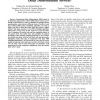Free Online Productivity Tools
i2Speak
i2Symbol
i2OCR
iTex2Img
iWeb2Print
iWeb2Shot
i2Type
iPdf2Split
iPdf2Merge
i2Bopomofo
i2Arabic
i2Style
i2Image
i2PDF
iLatex2Rtf
Sci2ools
COMCOM
2006
2006
A robust packet scheduling algorithm for proportional delay differentiation services
Proportional delay differentiation (PDD) model is an important approach for relative differentiated services provisioning on the Internet. It aims to maintain pre-specified packet queueing-delay ratios between different classes of traffic at each hop. Existing PDD packet scheduling algorithms are able to achieve the goal in long time-scales when the system is highly utilized. This paper presents a new PDD scheduling algorithm, called Little's average delay (LAD), based on a proof of Little's Law. It monitors the arrival rate and the cumulative delays of the packets from each traffic class, and schedules the packets according to their transient queueing properties so as to achieve the desired class delay ratios in both short and long time-scales. Simulation results show that, in comparison with other PDD scheduling algorithms, LAD can provide no worse level of service quality in long time-scales and more accurate and robust control over the delay ratio in short time-scales. In...
Related Content
| Added | 11 Dec 2010 |
| Updated | 11 Dec 2010 |
| Type | Journal |
| Year | 2006 |
| Where | COMCOM |
| Authors | Jianbin Wei, Cheng-Zhong Xu, Xiaobo Zhou, Qing Li |
Comments (0)

